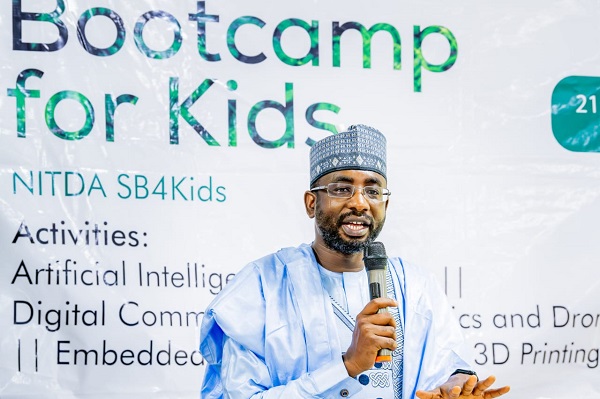
In a heartwarming event underscoring the significance of nurturing digital literacy and innovation among the younger generation, the director-general of the National Information Technology Development Agency (NITDA), Mallam Kashifu Abdullahi has reaffirmed the agency’s resolute commitment to empowering youth to shape Nigeria’s destiny through technology.
Abdullahi made this declaration during the closing ceremony of the NITDA STEM Bootcamp for Kids, a collaborative effort between the agency and the Future Map Foundation. This initiative brought together eager students aged 12 to 16 from various schools across Jigawa State.
The 10-day training programme, held concurrently in Rivers, Jigawa and the Federal Capital Territory (FCT), aim to cultivate children’s interest in science, technology, engineering and mathematics (STEM) disciplines while acquainting them with the boundless possibilities presented by digital technology.
Abdullahi underscored the contemporary relevance of STEM in the world today, highlighting technology as the driving force behind global innovation and economic growth. He emphasised the urgency for young Nigerians to embrace digital literacy as a means to secure a prosperous future.
“Today, the world is driven by technology, and those who possess the knowledge and skills to harness it will lead the way. Nigeria has an abundance of talent, and by investing in STEM education from an early age, we can unlock our country’s potential and compete on the global stage,” remarked Abdullahi.
The director-general also shared personal anecdotes and insights from his journey as a technology enthusiast who eventually became the head of a prominent IT agency. He encouraged the students to dream big and take full advantage of the digital resources at their disposal.
“I started as a young enthusiast like you, with a passion for technology. I became a millionaire while doing my mandatory youth service. Today, I have the privilege to lead NITDA, an agency dedicated to shaping the nation’s digital future. The power of technology is in your hands and I implore you to explore it to the fullest,” he said.
Furthermore, Abdullahi emphasised the importance of creativity, innovation and problem-solving, deeming them essential skills for the future workforce. He highlighted that the STEM Bootcamp offered a range of hands-on activities and workshops, allowing students to delve into robotics, coding, and virtual reality, thus sparking their interest in the world of technology.
At a similar STEM Bootcamp for Kids closing ceremony in Abuja, Abdullahi, represented by acting director of corporate planning and strategy, Dr. Aristotle Onumo, expressed his belief that with information and communications technology (ICT) tools readily available at children’s fingertips, they will be prepared to change the narrative and overcome barriers hindering their progress in achieving their dreams.
He asserted that the training would enable children to be well-versed in emerging technologies, enhance their creativity, innovation, and intellectual capabilities to excel in offering solutions to problems. He emphasised that digital technologies have no barriers related to age, gender, or experience.
Abdullahi pointed out that programmes like this, which fall under the digital literacy and skills pillar of NITDA’s Strategic Roadmap and Action Plan (SRAP 2021-2024), contribute to the development of digital technology by supporting, promoting and facilitating digital skills and literacy. These programmes also foster innovative solutions for adoption and use in various aspects of national life, with the agency aiming to achieve a digitally literate population of 95 pr cent of Nigerians by 2030.
The event garnered praise from parents, educators, and local officials who recognized the value of such initiatives in equipping young Nigerians with the skills needed to thrive in a digital world.
Participants who demonstrated remarkable dedication and exceptional skills throughout the rigorous training programme received computers and tablets as tokens of recognition for their outstanding performance. Certificates of achievement were also awarded to 790 beneficiaries, irrespective of their individual performance levels.


